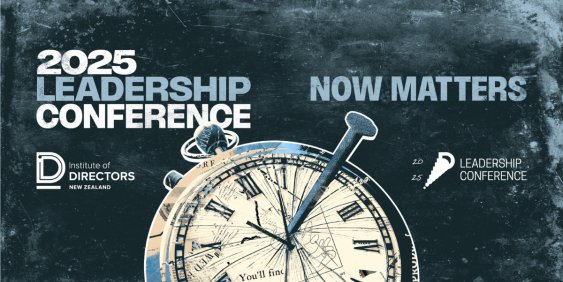Boardroom Premium


At the IoD Leadership Conference, the Prime Minister calls on directors to lead strategically on technology, performance and productivity.
New Zealand Prime Minister Rt Hon Christopher Luxon did not mince words when asked what single item he would place on every board agenda in the country. Speaking at the Institute of Directors’ Leadership Conference in Tāmaki Makaurau Auckland, he pointed squarely to technology.
“The technological revolution is not coming – it’s here,” he said. “It’s not just going to affect one sector. It’s the whole system.
Luxon said technology is advancing exponentially, while many businesses still move linearly. Boards should prioritise the conversation on how this disruption will play out – for customers, commercially and culturally.
The message was clear: technology and AI are reshaping every part of the economy, and boards must respond with urgency and purpose.
In the public sector, Luxon said the challenge is even more pronounced. “We have organised the way we have for 100 years with agencies and government departments, and yet we’re not very customer-centric,” he said.
“The technology and AI application is a massive opportunity for us in government, and it’s the same for you as directors.”
He described the governance conversation around technology as fundamentally cultural – not just technical. “You can build a great commercial business and have a fantastic bottom line, but if the customer experience or internal culture is poor, you’ve failed,” he said. “And I think in government, we lose sight of the customer. The customer is the New Zealand public.”
Luxon said technology must also be understood as a critical enabler of productivity. “Under successive governments, we've really failed to lift the collective living standards of Kiwis despite how incredibly hard people are working,” he said. “That is why [we have a] big focus on education, a big focus on technology and innovation, red tape and competitive markets, on infrastructure, and certainly on trade and investment.”
Luxon also acknowledged the ongoing challenge of remuneration for directors in the public sector.
“We’ll never be as well remunerated as a private sector gig,” he said, “but we need to be much more competitive so at least it’s not an irritant or a hygiene factor that we can’t get over so we can attract good people to it.
“We’ve got to take a lot of grief . . . the opposition has to be pretty hard around increasing executive board director pay.”
Luxon said his own experience as a global CEO shaped his expectations of board engagement. “When I had strategically engaging directors, it was incredibly valuable. Every board meeting I left with one or two thoughts that I hadn’t really . . . I was provoked around.
“There’s a challenge moving from a certifying mode – box-ticking – to a strategically engaging mindset. There’s a tendency to go into process and actually lose sight of strategy and engagement.”
Throughout his remarks, Luxon returned to core expectations for directors. “Your focus needs to be on building strong companies, and that is about superior commercial returns, awesome customer experiences and fantastic return cultures,” he said.
“You can build a great commercial business and have a fantastic bottom line, but if the customer experience or internal culture is poor, you’ve failed.”
Turning to the global operating environment, Luxon said boards also need to confront the broader shifts in geopolitics.
“We are fundamentally seeing a shift from the rules-based system in the post-World War II order . . . institutions are breaking down,” he said. “The canvas may be choppy; you have to be even more clear strategically about where you're sailing your boat from and to. And the second thing is recognising being more resilient.”
Asked about directors’ duties and the regulatory environment, Luxon signalled an openness to reform. “We are very up for looking at liability settings . . . if it’s red tape that doesn’t add value, we want to remove it.”
He also encouraged directors to view their relationship with government as a partnership, not a dependency.
“It’s felt like a parent-child relationship . . . everyone asking, ‘what’s the government doing?’ But as directors, your job is to build great organisations and be adult-to-adult with government,” he said. “The ideas for how we improve come from people like you rather than necessarily our public service.”
On public sector governance more broadly, he emphasised performance and clarity. “Hopefully, we’re giving more clarity about what the expectations are, which is performance,” he said. “In many cases, we’re well behind where we are in the private sector . . . your quality of governance, the way you think, is very helpful.”
Luxon also reflected on his role as Chair of Cabinet, describing it as New Zealand’s most important board. “I don’t get to choose the army I go to war with,” he said. “I get delivered talent by the people through an election. My job is to develop it and get it working well.”
He introduced structured performance practices into the Cabinet table. “I formally sit down every six months with my ministers to give them feedback – whether they want it or not.”
If Luxon’s address was a call to boards to engage strategically with technology, trust was the thread woven throughout the day’s other keynotes – cited repeatedly as a vital competitive edge.
IoD Chair Ross Buckley CMInstD set the tone in his opening remarks.
“Let’s just pause and reflect. Imagine taking on your very first board appointment just six years ago. Would you have expected to be sitting here today, having already faced a global pandemic, accelerating climate change and extreme weather events, Brexit, and geopolitical conflicts involving Russia and Ukraine, Gaza, and tensions between China and Taiwan?
“Add to that an increasingly unpredictable United States, the imposition of tariffs, economic recessions, inflation surges, a weakening currency, falling confidence, volatile interest rates, cybersecurity threats, changing workforce expectations, remote working, supply chain disruptions, growing regulatory pressure – and now, the emergence of AI.”
Buckley referenced a recent global study by KPMG and the University of Melbourne, which surveyed 48,000 people across 47 countries on attitudes to trust and the use of AI. New Zealand ranked 41st for the regular use of AI to drive productivity, with Australia just ahead at 39th. “But we ranked highly in our desire for strong AI regulation and governance,” he said.
He closed with a reminder of the mindset directors must bring to today’s environment. “New challenges demand of us a willingness to take on and absorb new information, embrace new ideas, and endeavour to anticipate the future in order to make good decisions today.”
Kirsty Graham, US CEO of Edelman, opened day one with a keynote that was both timely and challenging. She urged directors and executives to step into their leadership roles with courage, clarity and empathy – and to recognise that trust, once institutional, is now deeply personal.
From the shifting dynamics of media and influence, to the need for transparent communication, consistent values and people-first workplaces, her message was clear: in an age of complexity, human connection is a strategic advantage. Boards can no longer delegate conversations about AI, risk or workforce wellbeing – they must lead them.
As she reminded us, agility is fast becoming the new stability. And leadership – grounded in listening, values and humanity – has never mattered more.
Meanwhile, Silicon Valley entrepreneur and NZME director Bowen Pan challenged directors to raise ambition, demand performance, shape a strong execution culture.
“We can build companies with scale and credibility. The challenge has shifted. It’s not ‘can we build?’ anymore. It’s ‘how bold are we prepared to be?’
“Winners are never satisfied,” Pan said. “It means raising the bar continuously, making progress visible and setting standards explicitly.”